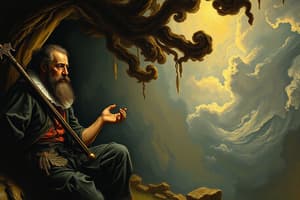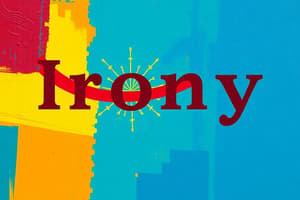Podcast
Questions and Answers
Match the following literary devices with their definitions:
Match the following literary devices with their definitions:
Absurdity = The quality of being ridiculous or wildly unreasonable Antithesis = The juxtaposition of contrasting words or ideas in a balanced or parallel structure Anachronism = Something or someone that is not in its correct historical or chronological time Caricature = A representation in which the subject's distinctive features or peculiarities are deliberately exaggerated to produce a comic effect
Match the following types of irony with their descriptions:
Match the following types of irony with their descriptions:
Dramatic Irony = When the audience knows something that the characters do not Verbal Irony = When a person says one thing and means another Situational Irony = When the outcome is different from what was expected Juxtaposition = The act or placement of two things (usually abstract concepts) near each other
Match the following comedic techniques with their definitions:
Match the following comedic techniques with their definitions:
Hyperbole = Exaggerated statements or claims not meant to be taken literally Parody = An imitation of the style of a particular writer, artist, or genre with deliberate exaggeration for comic effect Pun = A play on words that produces a humorous effect by using a word that suggests two or more meanings Sarcasm = The use of irony to mock or convey contempt
Match the following literary devices with their definitions:
Match the following literary devices with their definitions:
Match the following comedic techniques with their definitions:
Match the following comedic techniques with their definitions:
Match the following figures of speech with their definitions:
Match the following figures of speech with their definitions:
Match the following literary term with its definition: Absurdity
Match the following literary term with its definition: Absurdity
Match the following literary term with its example: Double Entendre
Match the following literary term with its example: Double Entendre
Match the following literary term with its example: Situational Irony
Match the following literary term with its example: Situational Irony
Flashcards are hidden until you start studying
Study Notes
Literary Devices and Techniques
- Literary devices are used to convey meaning, tone, and atmosphere in literary works.
Irony
- Irony involves saying the opposite of what is meant, often to be sarcastic or humorous.
- Types of irony include:
- Situational Irony: when the opposite of what is expected to happen occurs.
- (Definitions of other types of irony)
Comedic Techniques
- Comedic techniques are used to create humor in literature.
- Examples of comedic techniques:
- (List of comedic techniques with definitions)
Figures of Speech
- Figures of speech are words or expressions that deviate from literal meaning.
- Examples of figures of speech:
- Double Entendre: a phrase or sentence that can be interpreted in two or more ways.
Literary Terms
- Absurdity: a literary term that describes a situation or character that is unreasonable, illogical, or unconventional.
- Situational Irony: when the opposite of what is expected to happen occurs.
Studying That Suits You
Use AI to generate personalized quizzes and flashcards to suit your learning preferences.




